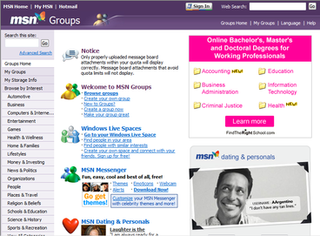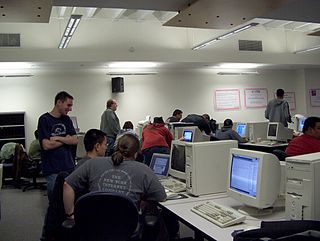A pseudonym or alias is a fictitious name that a person assumes for a particular purpose, which differs from their original or true name (orthonym). This also differs from a new name that entirely or legally replaces an individual's own. Many pseudonym holders use them because they wish to remain anonymous, but anonymity is difficult to achieve and often fraught with legal issues.

LiveJournal, stylised as LiVEJOURNAL, is a Russian-owned social networking service where users can keep a blog, journal, or diary. American programmer Brad Fitzpatrick started LiveJournal on April 15, 1999, as a way of keeping his high school friends updated on his activities. In January 2005, American blogging software company Six Apart purchased Danga Interactive, the company that operated LiveJournal, from Fitzpatrick.
An online community, also called an internet community or web community, is a community whose members interact with each other primarily via the Internet. Members of the community usually share common interests. For many, online communities may feel like home, consisting of a "family of invisible friends". Additionally, these "friends" can be connected through gaming communities and gaming companies. Those who wish to be a part of an online community usually have to become a member via a specific site and thereby gain access to specific content or links.
Social software, also known as social apps or social platform includes communications and interactive tools that are often based on the Internet. Communication tools typically handle capturing, storing and presenting communication, usually written but increasingly including audio and video as well. Interactive tools handle mediated interactions between a pair or group of users. They focus on establishing and maintaining a connection among users, facilitating the mechanics of conversation and talk. Social software generally refers to software that makes collaborative behaviour, the organisation and moulding of communities, self-expression, social interaction and feedback possible for individuals. Another element of the existing definition of social software is that it allows for the structured mediation of opinion between people, in a centralized or self-regulating manner. The most improved area for social software is that Web 2.0 applications can all promote co-operation between people and the creation of online communities more than ever before. The opportunities offered by social software are instant connections and opportunities to learn. An additional defining feature of social software is that apart from interaction and collaboration, it aggregates the collective behaviour of its users, allowing not only crowds to learn from an individual but individuals to learn from the crowds as well. Hence, the interactions enabled by social software can be one-to-one, one-to-many, or many-to-many.

USENIX is an American 501(c)(3) nonprofit membership organization based in Berkeley, California and founded in 1975 that supports advanced computing systems, operating system (OS), and computer networking research. It organizes several conferences in these fields.
In Internet culture, a lurker is typically a member of an online community who observes, but does not participate by posting. The exact definition depends on context. Lurkers make up a large proportion of all users in online communities. Lurking allows users to learn the conventions of an online community before they participate, improving their socialization when they eventually "de-lurk". However, a lack of social contact while lurking sometimes causes loneliness or apathy among lurkers.

The Whole Earth 'Lectronic Link, normally shortened to The WELL or, alternatively, The Well, is a virtual community that was launched in 1985. It is one of the oldest continuously operating virtual communities. By 1993 it had 7,000 members, a staff of 12, and gross annual income of $2 million. A 1997 feature in Wired magazine called it "The world's most influential online community." In 2012, when it was last publicly offered for sale, it had 2,693 members. It is best known for its Internet forums, but also provides email, shell accounts, and web pages. Discussion topics are organized into conferences that cover broad areas of interest. User anonymity is prohibited.

A hotspot is a physical location where people can obtain Internet access, typically using Wi-Fi technology, via a wireless local-area network (WLAN) using a router connected to an Internet service provider.

Flickr is an image hosting and video hosting service, as well as an online community, founded in Canada and headquartered in the United States. It was created by Ludicorp in 2004 and was previously a common way for amateur and professional photographers to host high-resolution photos. It has changed ownership several times and has been owned by SmugMug since April 20, 2018.

MSN Groups was a website part of the MSN network which hosted online communities, and which contained Web pages, hosted images, and contained a message board. MSN Groups was shut down on February 21, 2009, as part of a migration of online applications and services to the Windows Live brand. Windows Live Groups, a part of the Windows Live branding, was never marketed as, or intended to be a replacement for, MSN Groups.
Internet identity (IID), also online identity, online personality, online persona or internet persona, is a social identity that an Internet user establishes in online communities and websites. It may also be an actively constructed presentation of oneself. Although some people choose to use their real names online, some Internet users prefer to be anonymous, identifying themselves by means of pseudonyms, which reveal varying amounts of personally identifiable information. An online identity may even be determined by a user's relationship to a certain social group they are a part of online. Some can be deceptive about their identity.
A MOO is a text-based online virtual reality system to which multiple users (players) are connected at the same time.
The Facebook Platform is the set of services, tools, and products provided by the social networking service Facebook for third-party developers to create their own applications and services that access data in Facebook.
Fotki is a digital photo sharing, video sharing and media social network website and web service suite; it is one of the world's largest social networking sites. As an image hosting service, Fotki licenses photo-sharing software for global companies such as Telecom Italia, Alice.it, Sears, Mark Travel, Vegas.com, and Funjet.com, among others.
Roblox is an online game platform and game creation system developed by Roblox Corporation that allows users to program and play games created by themselves or other users. Created by David Baszucki and Erik Cassel in 2004 and released in 2006, the platform hosts user-created games of multiple genres coded in the programming language Lua. For most of Roblox's history, it was relatively small, both as a platform and as a company. Roblox began to grow rapidly in the second half of the 2010s, and this growth has been accelerated by the COVID-19 pandemic.

A Linux User Group or Linux Users' Group (LUG) or GNU/Linux User Group (GLUG) is a private, generally non-profit or not-for-profit organization that provides support and/or education for Linux users, particularly for inexperienced users. The term commonly refers to local groups that meet in person but is also used to refer to online support groups that may have members spread over a very wide area and that do not organize, or are not dependent on, physical meetings. Many LUGs encompass FreeBSD and other free-software / open source Unix-based operating systems.

vSide was an Internet-based 3D virtual world that was launched on May 15, 2006. The game is in its public beta phase. However, the game appears to have been discontinued as of 2021. Initially developed by American studio Doppelganger, Inc., a studio founded in 2004, the game was acquired in June 2009 by ExitReality, which is the owner and developer. Inside the game's universe, users are called vSiders and can interact with each other through social networking, celebrity entertainment, virtual boutique shopping and self-expression. Membership is free.
A real-name system is a system in which users can register an account on a blog, website or bulletin board system using their legal name.
Frank Lee Burns was a U.S. Army lieutenant colonel who served in Vietnam and, in retirement, became an information specialist.

Nextcloud is a suite of client-server software for creating and using file hosting services. Nextcloud provides functionality similar to Dropbox, Office 365 or Google Drive when used with integrated office suites Collabora Online or OnlyOffice. It can be hosted in the cloud or on-premises. It is scalable, from home office software based on the low cost Raspberry Pi, all the way through to full sized data centers that support millions of users. Translations in 60 languages exist for web interface and client applications.







